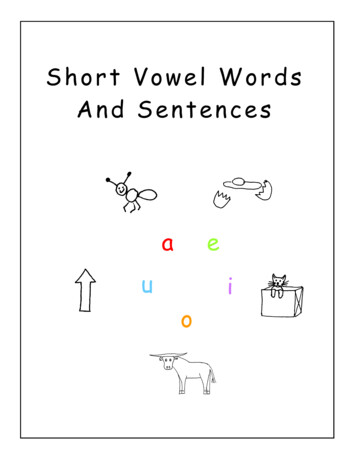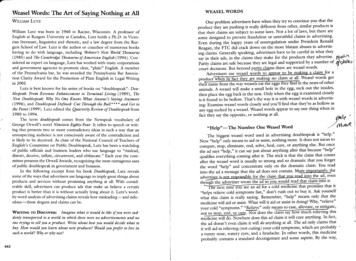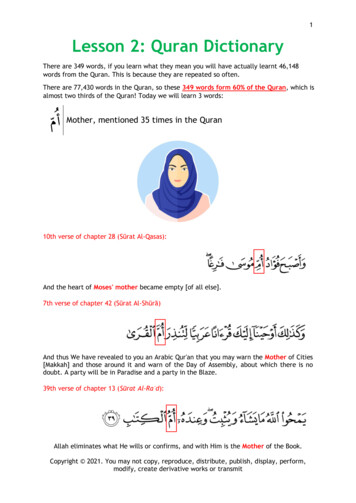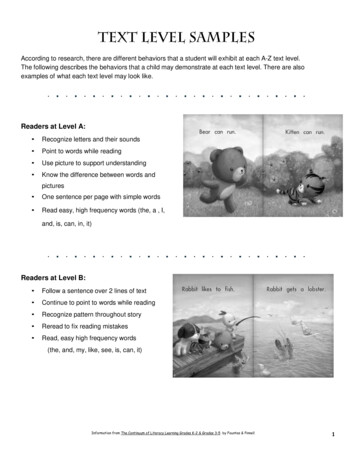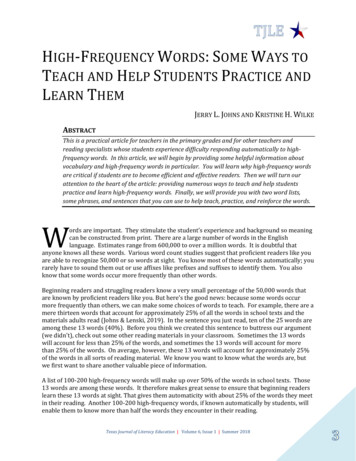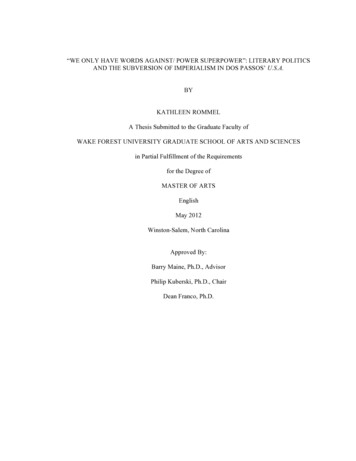
Transcription
“WE ONLY HAVE WORDS AGAINST/ POWER SUPERPOWER”: LITERARY POLITICSAND THE SUBVERSION OF IMPERIALISM IN DOS PASSOS’ U.S.A.BYKATHLEEN ROMMELA Thesis Submitted to the Graduate Faculty ofWAKE FOREST UNIVERSITY GRADUATE SCHOOL OF ARTS AND SCIENCESin Partial Fulfillment of the Requirementsfor the Degree ofMASTER OF ARTSEnglishMay 2012Winston-Salem, North CarolinaApproved By:Barry Maine, Ph.D., AdvisorPhilip Kuberski, Ph.D., ChairDean Franco, Ph.D.
Your two eyes are an accurate stereoscopiccamera, sure enough but the process by whichthe upsidedown image on the retina takes effecton the brain entails a certain amount ofunconscious selection. What you see depends toa great extent on subjective distortion andelimination which determines the varied impactson the nervous system of speed of line, emotionsof color, touchvalues of form. Seeing is aprocess of imagination.-- John Dos PassosIteration alters, something new takes its place.-- Jacques Derridaii
TABLE OF CONTENTSABSTRACT . ivINTRODUCTION. vCHAPTER ONE . 1Regulating Discourse, Regulating Empire: Transitions from Classical to Neoteric Imperialism inU.S.A.CHAPTER TWO . 36Media Discipline and Subversive Mimicry: A Destabilizing Appropriation of Imperial Techniquein the NewsreelsCHAPTER THREE . 53Biographical Mimicry and Subversive Iterability in U.S.A.CHAPTER FOUR . 73Success Through Failures: Recognizing Fictions and Decentering Regulatory Discourse in theNarrativesCHAPTER FIVE . 88The Development of a Literary Mode of Subversion in the Camera EyesCONCLUSION . 99WORKS CITED. 104SCHOLASTIC VITA. 111iii
ABSTRACTDespite a history of territorial expansion, “In the United States it is almost heresy to describe thenation as an empire” (Van Alystne 6). Refuting such tendencies for historical revisionism, DosPassos’ U.S.A. portrays an America where both classical and neoteric imperialisms pervadeAmerican political, media, and economic systems during the first three decades of the twentiethcentury.While various foreign entanglements provide America with classical territorialexpansion, World War I facilitates America’s transition towards a form of neoteric imperialismthat necessitates the adoption of imperialistic systems of discipline in the domestic sphere. U.S.A.critiques America’s neoteric imperialism by demonstrating how such methods, and specificallythe manipulation of discourse, categorize the vast majority of Americans as “non-authentic”Americans who are less “American” than political, industrial, and media elites. However, I argueDos Passos counters such detrimental public discourse by appropriating imperialistic systems ofcontrol for subversion. By exposing the damaging effects of colonial mimicry and exploiting alinguistic interpretation of mimicry through language’s iterability, Dos Passos destabilizesimperialistically motivated fictions that oppress America’s majority. Therefore, U.S.A. empowersmarginalized Americans through recognition, as the trilogy provides a model of ethicalsubversion that limits the continuation of America’s imperialistic discipline and control.iv
INTRODUCTIONTo guide his reading of John Dos Passos’ U.S.A., Jacques Rancière defines the politics ofliterature, where “Literature is the deployment and deciphering of signs written on,” and alsothrough, “things themselves” (15). Similarly aware of Dos Passos’ literary politics, Seth Moglendescribes U.S.A. as a literary “attempt to mourn a political loss” of America’s divergence from itsfounding ideals (172). By framing the trilogy’s The 42nd Parallel, 1919, and The Big Money asacts of literary politics, the following chapters examine the various stylistic and structural formsin U.S.A. and how they express the political content of the novels. Such a reading will offer anopportunity to explore the text’s operative relationship to the domestic and internationalimperialist structures revealed in Dos Passos’ depiction of America, while also establishing acontext for a discussion about the transformative powers of literature. Investigating Dos Passos’use of form within the context of colonial mimicry and linguistic iterability explains how DosPassos utilizes his text to counter the domestic imperialism of the first three decades of thetwentieth century.Moreover, a poststructuralist, postcolonial reading of U.S.A. reveals thesubversive potential implicit in the trilogy’s representation of subaltern voices. Consequently,reading U.S.A. in conjunction with Homi Bhabha, Jacques Derrida, Michel Foucault, as well asJudith Butler, establishes the ethical implications of a literature that is simultaneously a productof and a response to potentially oppressive American systems.In the January 1920 issue of the Dial, Dos Passos wrote, “There never has been great artthat did not beat with every beat of the life around it” (qtd. in Ludington 193). Written in 1920and 1925 respectively, Three Soldiers and Manhattan Transfer both reveal this sentiment as DosPassos recreates the mood and feel of American experience to make a political statement. Yetdespite these early literary forays, critics of Dos Passos agree that U.S.A. most fully achievessuccessful representations of the “the mind of a generation” (Dos Passos qtd. in Béja). Not onlydoes U.S.A.’s documentary montage and reproduction of the vernacular succeed in offeringv
literary realism, but Dos Passos’ ability to recreate “the speech of the people” also provides himthe opportunity to synthesize his perception of Americanness with political satire of Americanclassical and domestic imperialism (Dos Passos The 42nd Parallel xiv).Depicting the events that occur in the decades surrounding Woodrow Wilson’spresidency, a period where “compliments [were] paid for repudiating the ‘imperialism’” of theprevious presidents, U.S.A. refutes the historical fallacy of America’s recovery from a briefimperialist “sickness” by exposing the modern application of imperialist techniques of the earlytwentieth century (Van Alystne 6). As Van Alystne describes and U.S.A. reflects, “In the UnitedStates, it is almost heresy to describe the nation as an empire” (6). Ian Tyrrell similarly notes,“The pre-historicist idea of the United States as a special case ‘outside’ the normal patterns andlaws of history runs deep in American experience” (1031). America’s uniqueness as a politicalexperiment in democracy frames the language of American exceptionalism, where, “In this liberalworld view, the United States avoided the class conflicts, revolutionary upheaval, andauthoritarian governments of ‘Europe’ and presented to the world an example of liberty for othersto emulate” (Tyrrell 1031).Yet despite denials of American empire and insistence onexceptionalism, Dos Passos’ trilogy reproduces the speech of the people to accentuate theprevalence of classical and neoteric imperialism in America.In other words, as Rancièredescribes the trilogy, U.S.A. “welcome[s] into its pages the standardized messages of the world”in order to expose such denials of empire and decipher the messages implicit to the language ofAmerican discourse (27). The banal speech of the people ceases to be mundane as Dos Passosuses public discourse’s diction to counter the imperialistic governance occurring in America.In each novel of the U.S.A. trilogy, Dos Passos utilizes four distinct methods—documentary montage, biography, narrative, and autobiographical prose poetry—to represent theimperialist system that pervades American society in first three decades of the twentieth century.Though recent literary criticism of Dos Passos remains regrettably sparse, scholars have exploredthe complexities of each of these forms both as distinct literary components and in juxtapositionvi
with surrounding stylistic forms. Through this discourse, critics establish Dos Passos as anauthor who participates in high modernist techniques of cinematic montage as well as moreconventional forms of narrative. However, due to his modernist style, critics commonly discussDos Passos in the context of his “Lost Generation” contemporaries, including Ernest Hemingway,F. Scott Fitzgerald, and James Joyce, or in the context of other forms of art such as motion pictureand visual art.While these works of criticism tend to be flattering towards Dos Passos’achievements as they frequently allude to Jean-Paul Sartre’s unhesitant praise of the trilogy, theuniqueness of Dos Passos’ literary intention fails to be fully addressed through such comparisons.U.S.A. undeniably reflects the literary atmosphere of its time, yet Dos Passos also diverges fromhis contemporaries in both content and style; consequently, additional literary examinations arenecessary in order to avoid relegating Dos Passos’ text to a hierarchical comparison with hisadmittedly more widely read colleagues.In addition to such comparisons, many critics focus on the overt Marxism of U.S.A.However, while Marxist leanings do inform Dos Passos’ novels, it is important to note that DosPassos’ critique of imperialist discourse foreshadows his eventual rejection of Marxist ideology.In other words, while Dos Passos’ socialist sympathies are admittedly obvious, the literarypolitics in U.S.A. establish an unavoidable tension that suggests his leftist political leanings willeventually undergo scrutiny for similar manipulations of language—a process that ultimately ledto Dos Passos’ abandonment of Marxist ideology. Unqualified Marxist readings of his textsfundamentally overemphasize the Marxist viewpoints expressed in the trilogy and misconstrue itspolitical dynamics. Therefore, as a consequence of Dos Passos’ personal political activities, littlescholarly writing exists on the prevalence of American imperialism even though this politicalstructure pervades the novels. Relatedly, those critics who do succeed in recognizing Dos Passos’interest in imperialism tend to concentrate on the most obvious satirical forms of the novel bylargely restricting themselves to the Newsreels and biographies. These scholarly articles typicallyvii
focus on imperialism in its classical international sense and generally fail to recognize DosPassos’ interpretation of imperialism’s neoteric domestic application.By reading U.S.A. in conjunction with Bhabha, Derrida, Foucault, and Butler, thefollowing chapters rectify the limitations of these critical scopes by exploring how America’sgoverning systems utilize imperialist techniques to defend the country’s foreign policies and tomaintain domestic control; such a reading examines the role of language and literature inrepresenting subaltern voices within a political system that traditionally excludes their voices. InU.S.A., Dos Passos depicts an America where multiple modes of imperialism pervade foreignpolicy, the media, and public discourse. Identifying imperialism’s most classical form, DosPassos describes American foreign policy as expansionist attempts to assert territorial andpolitical control in the Philippines, the Caribbean, Mexico, and eventually Europe. However, inaddition to such a classical understanding of imperialism, Dos Passos also documents America’sgradual transition to more neoteric expressions of imperialism. As portrayed in the trilogy’schronological progression, the United States undergoes significant economic growth during thepre-WWI and WWI period that establishes its influence abroad.With such an emergingeconomic presence, America uses its control of capital to further its political influence.Significantly, such transitions towards neoteric imperialism necessitate that Americaadopt stricter controls over its own population. Foucault’s explanation that the government must“make [its population] more obedient as it becomes more useful” manifests itself throughAmerica’s strict control of the general public’s actions as well as their opinions (FoucaultDiscipline and Punish: The Birth of the Prison 137).While the government does rely ontraditional modes of control, the public discourse further fortifies the manipulation of theAmerican population. Judith Butler explains, “One way a hegemonic understanding of politics isachieved is through circumscribing what will and will not be admissible as part of the publicsphere itself” (Butler Precarious Life xx). Standardized public discourse allows for a unifiedportrayal of American policies, which in turn encourages homogeneity throughout the population;viii
the resulting consistency of public opinion then functions as a self-perpetuating mode ofdiscipline for those who consider countering its content (Foucault Discipline 182). As EdwardSaid explains, blocking alternate narratives through censoring results in the language presented inthe media becoming the only version of events that is considered true. Therefore, the publicdiscourse becomes what Stuart Hall describes as “the selective construction of social knowledge,”by which the American public can compare themselves to others (Hall qtd. in Tomlinson 60).These comparisons further encourage homogeneity by relying on the psychological desire toshare a similar “world-of-the-whole” as one’s peers (Hall qtd. in Tomlinson 60); the publicadopts the message initially presented in the media and self-regulation becomes an additionalmode of enforcing discipline.The relationship between media portrayals of American policies and modes ofAmericanness dictate an “incredibly direct” relationship between imperial politics andexpressions of national culture (Said Culture 8). To regulate the public’s perceptions concerningpolitical policies, America’s powerful elites—including politicians, newspaper moguls, andindustrialists—promote the language of American exceptionalism, altruism, and the “Americandream” in both implicit and explicit expressions. As Said describes, these influential figuresoften focus on “American specialness, altruism, and opportunity” as foundational aspects ofcontrolling the public’s perception of America’s past, present, and future (Said Culture 8).Emphasizing America’s exceptional nature justifies various foreign involvements through theinvocation of altruistic intentions. Regardless of the true intent of America’s policies, suchdiscourse “distorts, disfigures, and destroys” versions of history that can be considered critical ofAmerica’s unstated pursuit of empire (Fanon 210). Such standardized portrayals of Americanpolicies create an undemocratic, restricted America that contradicts the same language that thenation promotes. As Judith Butler explains, instead of equality and freedom of expression, suchan atmosphere dictates that “criticism, which ought to be central to any democracy, becomes afugitive and suspect activity” (Butler Precarious xx). The American population must accept theix
versions of discourse promoted in the media and by America’s elites to avoid being deemedoffensive, subversive, and even treasonous. Therefore, the public must consent to, or at the veryleast condone, the linguistic avoidance of empire even if they recognize the imperialism inherentto American policy.While insistence on American exceptionalism and altruism effectively restricts publicdiscourse concerning international policies, the country’s growing imperialistic influence resultsin the need to even further regulate the population. As Butler explains, the control of publicdiscourse results in “the sphere of appearance establish[ing] what will count as reality, andwhat will not. It is also a way of establishing whose lives will be marked as lives” (ButlerPrecarious xx).Those Americans who directly support American pursuit of empire, such aspoliticians, those who control media discourse, and those industrialists who contribute toAmerican economic dominance, enjoy the recognition of lives that “count” within the publicsphere, while the remainder of the American population finds itself marginalized (ButlerPrecarious xx). Using Bhabha’s terms, these powerful elites exist as “authentic” Americans wholargely adopt the role of the colonizing power as they limit the actions of the vast majority of the“non-authentic” population (Bhabha “Of Mimicry and Man” 88).These non-authenticAmericans only “count” to the degree by which they can be manipulated. If they continue theaims of American empire, they largely avoid “punishment” for their actions; nevertheless, theyalso fail to receive recognition as authentic lives that deserve equality.To manage their imperialistic control, those who regulate public discourse largely rely ontouting the American dream.Consistent with imperialistic methods of discipline, thefoundational aspects of this narrative correspond with what Bhabha describes as colonialmimicry. The narrative of American dream celebrates Americans who achieve success throughstrenuous work and personal sacrifice. Although all Americans who undergo such hardship donot necessarily experience the promises of the American dream, its narrative neverthelesscompels Americans to further its fictions and continue to imitate the behaviors of those whox
prosper. As such, the American dream advances homogeneity in belief while simultaneouslydisregarding the disparity between narrative and reality. Those who fail to fully achieve theAmerican dream may be similar to those who do in their actions and motivations, yet a crucialdifference that assures separation between the powerful elite and the mimicking majority stillexists. In the context of colonial mimicry, Bhabha similarly establishes, “Colonial mimicry is thedesire for a reformed, recognizable other, as a subject of difference that is almost the same, butnot quite” (“Mimicry” 86). Through this process, there remains “a discrimination between themother culture and its bastards, the self and its doubles, where the trace of what is disavowed isnot repressed but repeated as something different—a mutation, a hybrid” (Bhabha “Signs Takenfor Wonders” 111). Authentic figures—the proverbial mother culture or colonizers—strive torestrain the actions of non-authentics—the bastardly colonized—by encouraging the nonauthentic population to mimic the actions of those who enjoy power (Bhabha “Mimicry” 88,“Signs” 111). By promising potential equality yet simultaneously barring the opportunity forsuch marginalized figures to truly attain it, the controlling powers can maintain the contradictorypresence of “father and the oppressor; just and unjust; moderate and rapacious; vigorous anddespotic” (Bhabha “Sly Civility” 96). Non-authentic Americans strive to comply with the imageof Americanness promoted in the American dream because authentic Americans insist upon itsvalidity, regardless of the impossibility of achieving its fictions. The non-authentic majoritytherefore consents to the discipline of public discourse, accepts adversity with the hopes ofeventual achievement, and unquestioningly reproduces the language of authentic Americanswhile idealistically believing in American exceptionalism, equality, and opportunity.In his portrayal of these imperialistic methods before, during, and after WWI, DosPassos’ acknowledges how the regulation of public discourse and the propagation of theAmerican dream result in the marginalization of the vast majority of the American population.Additionally, however, Dos Passos also recognizes the potential for subversion within suchsystems. To most effectively convey his subversive intent, Dos Passos reappropriates what thexi
American elites consider a “safe space of subversion” for his own subversive ends (Greenblatt30). As Stephen Greenblatt’s Bakhtin-esque approach to subversion conveys, hegemonic systemsoften provide outlets for dissent that function as “the very product of that power,” through whichthe marginalized public actually fortifies the government’s control over them in the “subversionand its containment” (Greenblatt 30, 35). America’s influential elites “thrive on vigilance” ofdissenting voices, so they provide outlets for subversion that give the illusion of rebellion as theyreinforce systems of discipline and punishment (Greenblatt 37); moreover, in their attempt tomimic authentic Americans, the general population adopts a regulating gaze towards their ownpeers. As a foundational aspect of such multifaceted discipline, America’s powerful elites usetheir extensive control of discourse to establish language and literature as one of the safe spacesof subversion that can be manipulated to further imperialistic aims. While formal censorshipfundamentally obstructs non-standardized voices from circulating in public discourse, the publicalso adopts a self-disciplining approach to language that ultimately censors public discourse.Butler describes that, within a regulated media system, dissent is difficult “not only becausemainstream media will not publish [dissenting voices] but because to voice [such opinions] isto risk hystericization and censorship” (Butler Precarious 2). Dos Passos’ personal experiencewith censorship—including wartime censorship of correspondence as well as the threat ofcensorship during publication of his novels because the author would not “consent toparaphrases” of his literary work—indicates that the publication of subversive content oftenresults in strict responses of governmental punishment (Ludington 150, 193). Additionally, moresubtly enforced fear of retribution—such as “hystericization” and the realities of limitedreadership of controversial texts—also function as a form of informal discipline for those whochallenge the accepted versions of public discourse (Butler Precarious 2). Through both formaland informal censorship, America’s influential elites offer the public theoretical freedom ofspeech while simultaneously limiting the ability to exercise such freedom. Even if dissentingvoices succeed in getting published, such accounts largely fail to disseminate broadly enough toxii
subvert the control of the governing ideology. The widespread coercion for imitating elites andfor homogeneity compels the American public to refute such voices and discourage others frompursuing insubordination that would lead to a more diverse public discourse.To counter such a controlled space of dissent, Dos Passos appropriates the systems ofimperialistic control by utilizing a linguistic form of colonial mimicry: language’s iterability.Derrida defines iterability as a function of language’s repeatable nature. Language, he explains,“begins with reproduction” as it requires repetition as a foundational aspect of its functionality(Derrida Writing and Difference 211).Therefore, just as non-authentics attempt to mimicauthentic Americans’ actions, the diction of public discourse can also be precisely restated andrepeated in order to comply with accepted language. Yet despite technically accurate duplication,like Bhabha’s description of a “difference that is almost the same, but not quite,” Derrida arguesthat the repetition of language creates différance, a “sameness which is not identical” (Bhabha“Mimicry” 86; Derrida Speech and Phenomena and Other Essays on Husserl’s Theory of Signs129). Derrida further clarifies, “Iteration alters, something new takes its place” (Derrida LimitedInc. 40). Similar to the “mutation, hybrid” that results from mimicry, the iterability of languagecreates a hybrid utterance that both reflects its initial usage in public discourse as well as itsalternate usage in its new context (Bhabha “Signs” 111). For Dos Passos, this ability to preciselymimic the language of public discourse while also maintaining a différance facilitates hisreappropriation of the safe space of dissent. He technically retains safe subversion because hereplicates public discourse and therefore cannot be accused of inaccuracies or opposition, yet hismanipulation of its context “by inscribing or grafting” iterability into other chains of languageresults in “repetition with alterity” that critiques America’s imperialistic systems though the samelanguage that the imperial systems uses to fortify control (Derrida “Signature Event Context” 9).The safe space of subversion ceases to be safe because Dos Passos repeats strictly controlleddiction to expose the limitations as well as the formidable potential of language.xiii
As a crucial aspect of such subversive différance, Dos Passos’ iterability destabilizes thepublic discourse by “decentering the narrative ‘I’” that fixates on authentic Americans andexcludes non-authentic narratives (Butler Precarious 6-7). In U.S.A., Dos Passos’ recognition ofthe limitations of discourse is then employed in a manner similar to Butler’s approach torecognition and subaltern populations. Like Butler, U.S.A. questions “What can I do with theconditions that form me?” in order to rectify the “violence of derealization”—or in this case nonauthentication— that already marginalizes non-authentic Americans (Butler Precarious 16, 33).Iterating the language of the hegemonic regime in order to expose its imperialistic fallacies,U.S.A. grants marginalized Americans agency through the “decentering” of public discourse’sfictions and through the very acknowledgment of their relegation to the peripheries (ButlerPrecarious 7). As such, even as Dos Passos replicates the language of the influential elites, thedifférance of iterability indicates the damaging effects of such limited discourse on the nonauthentic population.Therefore, by providing public discourse with a supplement ofmarginalized voices, Dos Passos offers a model of simultaneity by which the recognition of apropagandistic public discourse becomes the very process of creating a more accuraterepresentation of the American population. He repeats the language of public discourse, yet“meanwhile” he represents those who are traditionally excluded from such utterances (Bhabha“Dissemination” 144). In other words, like Bhabha’s approach to the supplemental reading oftexts, Dos Passos emphasizes the significance of keeping public discourse open and “decentered”to what he considers equally important supplemental or subaltern presences (Bhabha“Dissemination” 144; Butler Precarious 18). His utilization of the politics of literature, includingU.S.A.’s focus on “reproducing facts” as well as retaining “a new regime of appropriatenessbetween the significance of words and the visibility of things,” therefore counters the discipliningcontrol of America’s elites (Rancière 15). Dos Passos sustains a productive tension between themeaninglessness of public discourse’s diction and the meaning-making potential of his owniteration; resultantly, even though the language of American discourse temporarily marginalizesxiv
its population, Dos Passos maintains the argument that “we only have words against / PowerSuperpower” (Dos Passos The Big Money 523).The following chapters will examine Dos Passos’ “attempt to speak the other’s languagewithout renouncing [his] own” by seeing in U.S.A. an effort to textualize the theoretical modes ofsubversion established here (Derrida “Racism’s Last Word” 294). To begin, Chapter One willexamine how Dos Passos’ trilogy introduces multiple modes of imperialism occurring in theyears before, during, and after WWI. This chapter not only reflects the history of America’sclassical imperialistic pursuits, but also exposes the country’s transition to neoteric domesticapplications of imperialist policies that rely on coercions of mimicry and, relatedly, the fiction ofthe American dream. Chapter Two will address Dos Passos’ most explicit practice of iterabilityin the Newsreels sections of the trilogy. In this chapter, I contend that Dos Passos’ preciseiteration of newsprint and song remains within a safe space of dissent by subverting the intent ofimperialistic systems through the replication of their very language. Chapter Three will thenexpand upon the pattern of subversion established in Chapter Two by examining the semi-factualbiographies of the trilogy. This chapter contends that Dos Passos uses biographies of bothauthentic and non-authentic Americans to expose the fallacies of traditional public discourse andoffer supplemental biographical narratives that represent subaltern voices. Chapter Four thenfocuses on the Eleanor Stoddard and the Joe Williams fictional narratives to exemplify DosPassos’ most conventional literary form and to examine its subversive capabilities. As such,Chapter Four addresses more personalized manifestations of the American dream and the ways inwhich the pervasive control of discourse ultimately encourages the non-authentic Americanpopulation to participate in the systems of control that oppress them. Finally, Chapter Fiveapproaches the Camera Eyes’ prose poems as a documentation of personalized fluctuationsresulting from exposure to imperialistic public discourse. Largely due to the Camera E
Dos Passos in the context of his "Lost Generation" contemporaries, including Ernest Hemingway, F. Scott Fitzgerald, and James Joyce, or in the context of other forms of art such as motion picture and visual art. While these works of criticism tend to be flattering towards Dos Passos' achievements as they frequently allude to Jean-Paul .
